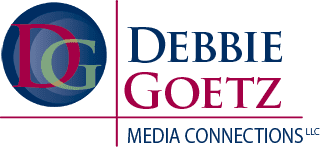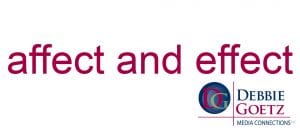Meanings Matter – Using Words Correctly in Your Writing
Emails, press releases, pitches, and social media posts are great ways to engage your audience and followers. And it is important that your communication tactics work for you, not against you. A thorough understanding of word usage can set you apart from other communicators and help you create a successful message.
Below are a few examples of words that are commonly misused:
Affect and Effect
These two words are a bit tricky because they both have multiple meanings. “Affect” is used mostly as a verb, as in “the poor weather affectseveryone.” “Effect,” on the other hand, is used as a noun. For example, “using words correctly has a positive effect on your audience.” While these words sound identical, they carry very different meanings.
Block and Bloc
“Block” has several meanings, but it does not share the meaning of bloc. “Block” refers to a solid piece of material or an obstacle. While “bloc” is “a group of people or countries that are connected by a treaty or agreement or by common goals,” according to the Merriam-Webster Dictionary.
Capital and Capitol
Washington D.C. is the capital of the United States and each state has a city that is its capital. But the U.S. Congress conducts business in the capitolbuilding and a state’s legislatures and governors do business in capitol buildings. “Capital” refers to the seat of government or the center of activity. “Capitol” on the other hand, is the actual building where Congress or government officials meet.
Complement and Compliment
If “you complement your coworker,” then you work well together and are well balanced. If “you compliment your coworker,” you are offering praise and admiration for that person. “Complimentary” also means that something is given free of charge, such as “a complimentary drink at a restaurant.”
It’s and Its
Here are two words that are easy to confuse. We learn at a young age that to make a word possessive we must add an apostrophe “s”. However, the English language has so many rules that overlap one another that it’s sometimes difficult to understand right from wrong. “It’s” is a contraction of “it is,” and “its” is the possessive form of “it”. “The English language is complex and sometimes it’s difficult to see its true meaning.”
Jive and Jibe
“Jive” is defined as “informal language that includes many slang terms” or “a type of fast, lively music” (Merriam-Webster Dictionary). When working as a verb, “Jibe” means to agree. For example, “Susan’s ideas do not jibe with Phil’s ideas.” “Jibe” can also mean a nautical maneuver or an insult when working as a noun.
Premier and Premiere
You attend a premiere of a movie or a play, while you buy the premier brand of a product. “Premier” means “first in position, rank or importance,” and “premiere” means “a first performance or exhibition” (Merriam-Webster Dictionary).
Principle and Principal
The word “principle” refers to rules or a code of conduct. Principal means someone who is chief or most important.
Utilize
“Utilize” means “to make use of” or “turn to practical use or account” (Merriam-Webster Dictionary). “Utilize” is commonly employed as a synonym for “use”. However, it makes the writer appear wordy and arrogant. “Use” is usually the better word choice.
Who’s and Whose
We saw earlier in this post the same issue with “it’s” and “its”. “Who’s” is a contraction of “who is” or “who has”. “Whose” is the possessive form of “who”.
These are only a few commonly misused words, but keep them in mind when you are writing your next press release or social media post. Every time you communicate something, look at it like a first impression that could work for you, or against you. It’s up to you to be your own editor.
Featured image courtesy of https://info.francistuttle._edu/

